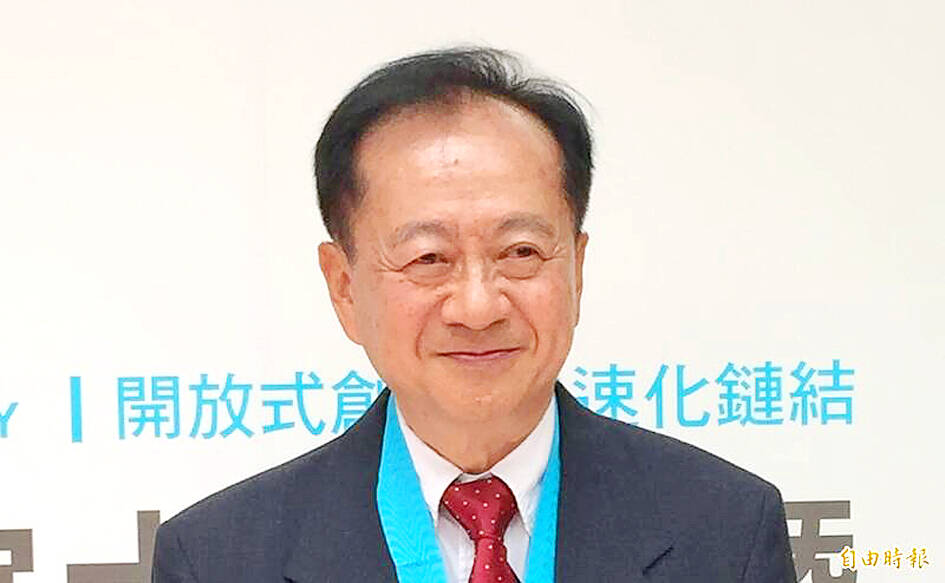The struggles of China’s chip industry predate US sanctions, and “people” are the country’s “biggest hurdle,” former Taiwan Semiconductor Manufacturing Co (TSMC, 台積電) co-chief operating officer Chiang Shang-yi (蔣尚義) said in an interview.
Speaking on Era TV’s Taiwan Insights on Sunday, Chiang, who worked in China for several years after leaving TSMC in 2013, said that while Chinese firms might be capable of solving the technical aspects of research and development, he found during his time there that “the biggest hurdle was always people.”
Regarding his dealings with “political leaders” when serving as vice chairman of Shanghai-based Semiconductor Manufacturing International Corp (SMIC, 中芯國際), Chiang said he felt that he was “not trusted.”

Photo: Grace Hung, Taipei Times
“SMIC is headquartered in Shanghai, but has factories in Beijing. I was asked by then-SMIC chairman Zhou Zixue (周子學) to fly to Beijing when a high-ranking official wished to visit the factories, but twice I was shut out of the meetings because they only allowed People’s Republic of China citizens to attend,” Chiang said.
Zhou had tried to iron out the issue by setting up personal meetings with the Beijing official for Chiang, but “it was not a pleasant feeling,” he said.
With regards to US sanctions against Beijing, Chiang said they would slow down the development of China’s chip industry, but it remained to be seen if the pressure would end up forcing chipmakers to stand on their own feet.
“We do not know whether self-reliance could be achieved [in China’s semiconductor industry], but one also has to note that China has been developing the industry for more than 10 years and the US sanctions are actually very recent,” Chiang said.
China’s chip industry was “not that successful either when it was not restricted,” he added.
Chiang was first recruited by SMIC, China’s top foundry, as an independent director in 2016, before leaving to take up the position of CEO at Wuhan Hongxin Semiconductor Corp (HSMC, 武漢弘芯) in 2019.
He left HSMC in July 2020 and returned to SMIC in mid-December 2020 to take over as vice chairman, but left China a year later.
After leaving SMIC in 2021, he told local media in Taiwan that he would not work in China again.
Chiang in November last year joined Hon Hai Precision Industry Co (鴻海精密) as its chief strategy officer to integrate the resources of its semiconductor subsidiaries. In June, he was appointed to chair ShunSin Technology Holdings Ltd (訊芯科技), a semiconductor arm of Hon Hai that specializes in offering system-in-a-package modules and optical transceivers.
Additional reporting by Lisa Wang

‘SWASTICAR’: Tesla CEO Elon Musk’s close association with Donald Trump has prompted opponents to brand him a ‘Nazi’ and resulted in a dramatic drop in sales Demonstrators descended on Tesla Inc dealerships across the US, and in Europe and Canada on Saturday to protest company chief Elon Musk, who has amassed extraordinary power as a top adviser to US President Donald Trump. Waving signs with messages such as “Musk is stealing our money” and “Reclaim our country,” the protests largely took place peacefully following fiery episodes of vandalism on Tesla vehicles, dealerships and other facilities in recent weeks that US officials have denounced as terrorism. Hundreds rallied on Saturday outside the Tesla dealership in Manhattan. Some blasted Musk, the world’s richest man, while others demanded the shuttering of his

ADVERSARIES: The new list includes 11 entities in China and one in Taiwan, which is a local branch of Chinese cloud computing firm Inspur Group The US added dozens of entities to a trade blacklist on Tuesday, the US Department of Commerce said, in part to disrupt Beijing’s artificial intelligence (AI) and advanced computing capabilities. The action affects 80 entities from countries including China, the United Arab Emirates and Iran, with the commerce department citing their “activities contrary to US national security and foreign policy.” Those added to the “entity list” are restricted from obtaining US items and technologies without government authorization. “We will not allow adversaries to exploit American technology to bolster their own militaries and threaten American lives,” US Secretary of Commerce Howard Lutnick said. The entities

Minister of Finance Chuang Tsui-yun (莊翠雲) yesterday told lawmakers that she “would not speculate,” but a “response plan” has been prepared in case Taiwan is targeted by US President Donald Trump’s reciprocal tariffs, which are to be announced on Wednesday next week. The Trump administration, including US Secretary of the Treasury Scott Bessent, has said that much of the proposed reciprocal tariffs would focus on the 15 countries that have the highest trade surpluses with the US. Bessent has referred to those countries as the “dirty 15,” but has not named them. Last year, Taiwan’s US$73.9 billion trade surplus with the US

Prices of gasoline and diesel products at domestic gas stations are to fall NT$0.2 and NT$0.1 per liter respectively this week, even though international crude oil prices rose last week, CPC Corp, Taiwan (台灣中油) and Formosa Petrochemical Corp (台塑石化) said yesterday. International crude oil prices continued rising last week, as the US Energy Information Administration reported a larger-than-expected drop in US commercial crude oil inventories, CPC said in a statement. Based on the company’s floating oil price formula, the cost of crude oil rose 2.38 percent last week from a week earlier, it said. News that US President Donald Trump plans a “secondary